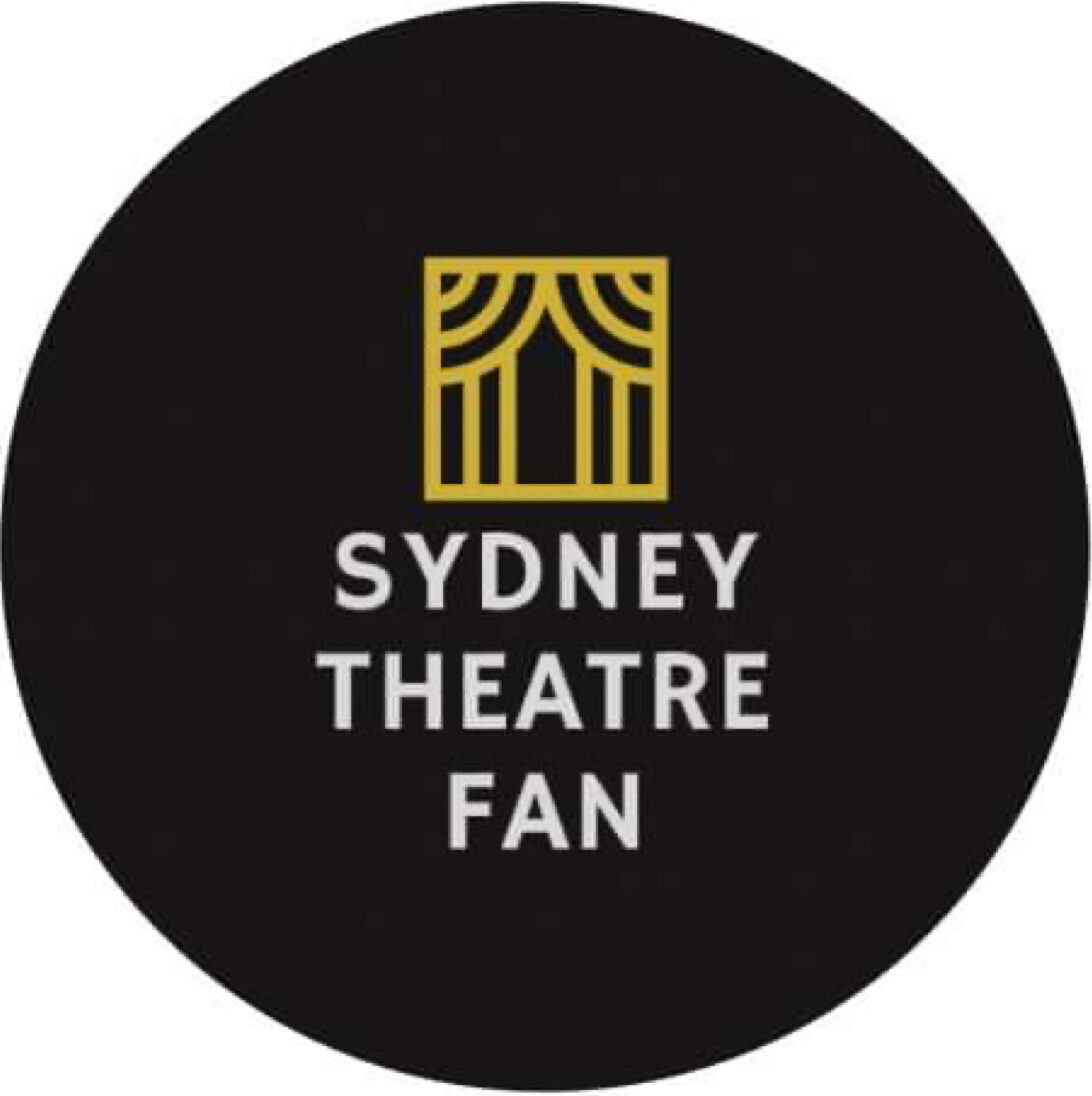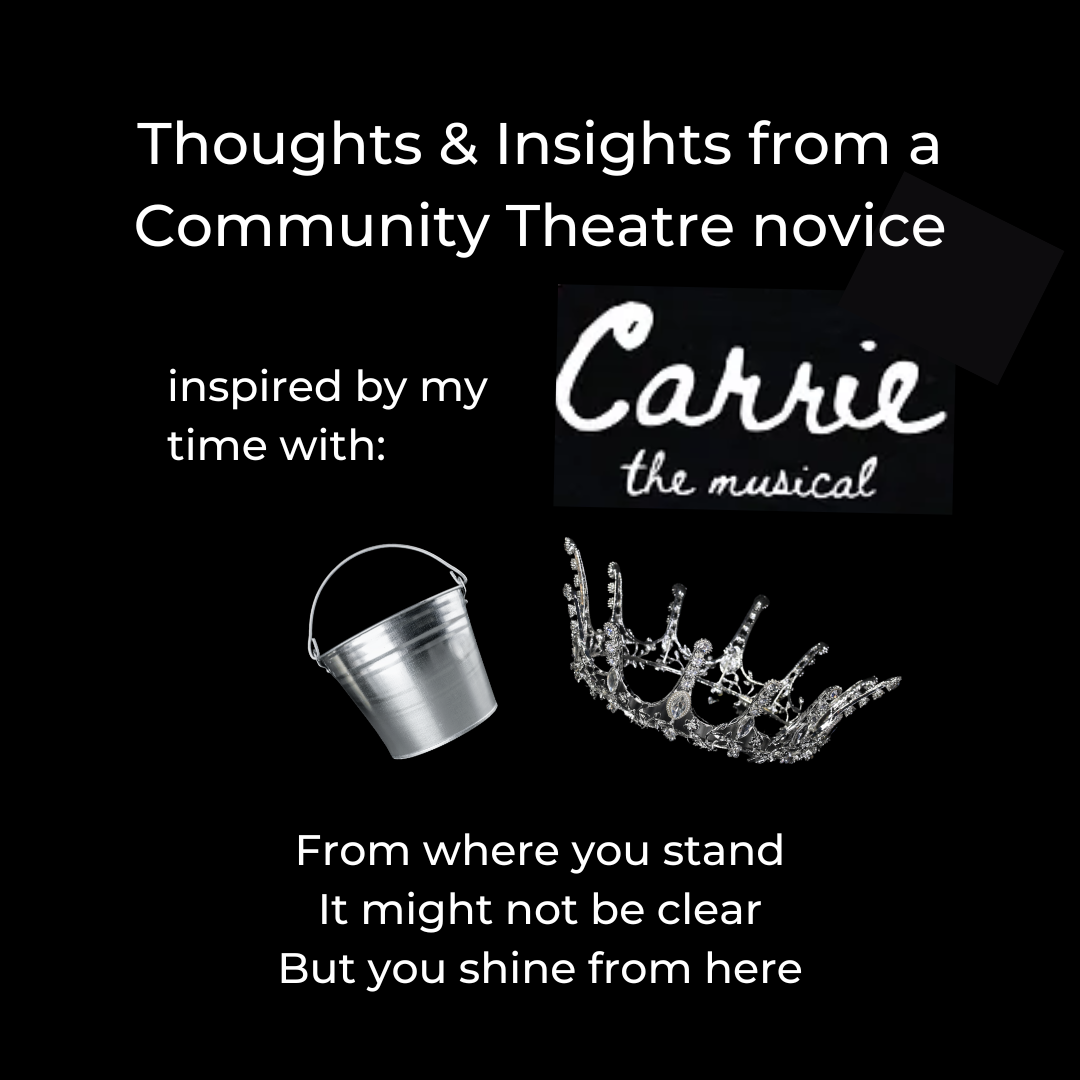I see a lot of theatre. At the start of the year, at my partner’s behest, I created a Theatre budget. I plugged in all of the shows I was planning to see, from big musicals at the Lyric and Royal Theatre, some things at Sydney Theatre Company, new works at Hayes and Griffin, and some interesting pieces at Belvoir, just to name a few.
My list, I’ve realised, was lacking. There is a tremendous amount of Community and Amateur theatre which had not been on my radar. Genesian Theatre, where I’ve seen a few things now, and Packemin Productions, I was familiar with. As well as The Regals Musical Society, where friends of mine were in the wildly popular Priscilla: Queen of the Desert last year.
The same friends encouraged me to audition for Carrie – a small, non-singing role, mainly comic relief. It has been two decades+ since I’ve been on a stage, and I was equal parts excited and fearful. But it has been the most wonderful and rewarding experience. I can’t review Carrie, since I’m obvious heavily biased, but I thought I might share some insights I’ve gained from this experience.
- There so much community theatre in Sydney
At the first rehearsal, I was blown away by how experienced the cast was. Most of them had worked together (or worked with friends of friends) in productions with Regals, locally, and even as far away as Gosford. I began hearing stories of shows from Engadine, Miranda, Rockdale, Notable, Blackout, Strathfield, Bankstown, and the list goes on. I hadn’t realised it, but I’d entered a multiverse of amateur Musical Theatre societies. As someone who loves Theatre, and is now accountable for sticking to a budget, this is a dream come true.
Now that this is on my radar, I fully intend to see a lot more community theatre -its affordable, and I now have 20+ castmates to support as they move on to their next productions.
- Community/Amateur does not mean amateur talent
I remember sitting in rehearsals, watching some of the musical numbers – this was early days still, and I wasn’t in many of the ensemble numbers. I recall how impressed I was with the calibre of the cast. The singing talent was incredible – better than I’ve seen in some professional shows. Many of the cast were also quite professional in their approach to rehearsing, taking notes, preparing – I was taken aback that this sort of talent gravitated toward a community theatre production.
And that’s not to say anyone was unprofessional – if anything, much of the cast was young, Gen Z (which was its own learning experience for me…). These are kids who were out of (or finishing up school), and starting to build a theatrical resume. I can’t wait to see how their careers evolve, if the nascent talent I witnessed is anything to go by.
It reinforces for me that Community Theatre is a fantastic place to find real talent who for one reason or another, isn’t in a professional production at a particular moment in time. The performers are absolutely of a professional standard. - It Takes a Village
I had forgotten how many people it takes to put on a show. Suddenly, our cast was dwarfed by the number of others who flooded the theatre to make our show happen:- Our brilliant band and conductor, under the direction of our stalwart musical director.
- A stage management team which I’m convinced fell from heaven, having replaced someone at the literal last minute.
- Light and sound techs who took this production into another level of quality – I’ve never heard an audience comment on lights, sound and production so much before!
- Front of house volunteers, stage hands, our talented-beyond-her-years costumer who lived backstage with us. The list goes on and on.
Considering many of these are unpaid positions, we are so incredibly fortunate for those who sacrificed their time so that we (the cast) could go on stage and sing and dance for a couple of hours every night. It also adds to the electric experience of live theatre – anything can go wrong at any time (and like any show, Carrie had its moments). With so many people in the wings, it was amazing to see how we could quickly recover and bounce back from any unplanned events, often with a laugh and a fun story to recount after.
- Intimidating to break into
I don’t know if I’ve mentioned this before, but I haven’t performed in a long time. And, as the rest of the cast were playing high school students, I was significantly older than most. As a result, I found the process to be quite intimidating. In part, this is due to the absolute legends in this show – kudos to the production team for the way they assembled this insanely talented group of people.
At the auditions, I realised I was woefully unprepared. Seeing the younger cast rocking up with their headshots, prepared songs – I was compelled to run away! Though the audition obviously went well for me, I do wonder if I was a little typecast. A stressed out, middle-aged American man was cast as a stressed out middle-aged American man – I joke that they’d cast me before I even started to read my sides.
I did find aspects of this experience to be challenging: I don’t read music and often felt ‘behind’ the talented cast. I’d never worked with a microphone before. I was unfamiliar with sitzprobe, bump-in, bump-out. I’d never heard of toilet paper awards. I do think there’s capacity for someone who may be new to a community theatre society to get a bit more support, in terms of understanding some of the basics. The production team were fabulous when I asked questions, but I wonder if there isn’t a way to help make Community Theatre a bit more accessible to those who maybe haven’t done it before. Particularly when, from what I’ve seen, there is a severe lack of males (and male presenting) across the region. - Provides the gift of performing to many
And accessibility is quite important, because Community Theatre has the tremendous capability to provide opportunities to so many people. Thinking back to the number of musical societies out there, and the number of shows happening simultaneously, there are easily a thousand or more opportunities each year for performers to join a show.
Whether its a hobby for someone who once did a bit more theatre in their youth (hello!), a way to build up experience before pursuing a professional career, a way to meet new people – Community Theatre is a wonderful thing, and has the power to change lives. Building self confidence, working as a team, developing and honing skills – it really is a magical thing. - It needs support
Carrie was an excellent show. Not just by Community Theatre standards, but professional as well. And yet, we didn’t sell out any of the performances. I was disappointed at that, as I really felt like this was a show worthy of a full house.
I look back at the myriad ways we could have promoted the show better perhaps. I mean, Community Theatre is rarely on anyones radar, unless you know someone in the cast. We were up against Vivid, world premieres from Hayes and Darlinghurst Theatre Company, Beauty and the Beast premiering and much more. This was on at the same time as shows in Adams Family (Miranda Musical Theatre Company), and shortly after Rockdale Musical Society wrapped its run of South Pacific in the same space.
The marketing is all volunteer led, both from the cast and the committee. I felt we were pretty creative with how we aimed to get the word out – market days, flyer hand outs, lots of social media. We were fortunate to have several reviewers come out (all with unanimously positive comments).
How, then, do we get the butts in the seats? Supporting Community Theatre is critical – particularly in light of Covid, where some societies actually did not survive, and rising costs of, well, everything. Without the Community behind it, there is a real threat that these opportunities and productions may cease to exist. - Why we do this?
This is a question I keep coming back to. I first asked this having seen a Community Theatre production I didn’t particularly enjoy – ultimately, if the first priority is to give opportunities to amateurs, I can get past bizarre directing choices and poor quality. But I find that there are instead many conflicting reasons for why people are drawn to Community Theatre.- to create high quality musical theatre, aimed to entertain?
- To educate and advance culture?
- To provide affordable, top tier entertainment outside of the CBD?
- To bring together people in the community for a common purpose?
- To establish a safe space for developing artists to hone their craft?
Each reason is valid, but comes into conflict with each other at times. I think a Musical Theatre society should have a clear intention and priority, that is understood and accepted at all levels of the organisation. I find that it impacts every decision from programming, casting, the rehearsal process, marketing and performances. It also impacts how the show is received.
I think its important, because if the main driver of a show is quality, sets the bar for the level of preparedness, the type of feedback, etc during the rehearsal process. If it is more about learning and opportunity, that’s great, and should be measured by how the cast and production developed through out the process. If it is about the audience, and providing affordable, local culture, are we putting on shows they want to see? I think its worth exploring these avenues, as if you try to be everything at once, you may end up falling short everywhere at once.
I am so fulfilled at having gotten to do Carrie. I hadn’t really thought I’d return to my theatre roots, and I definitely would not have assumed it would be in a musical inspired by Stephen King. I’ve found connection with others, rekindled a love of performing, learned some new skills, and was able to share my passion with my friends and family. I don’t think I’ve got another show in me for a while – this is hard work! – but I am forever grateful.

